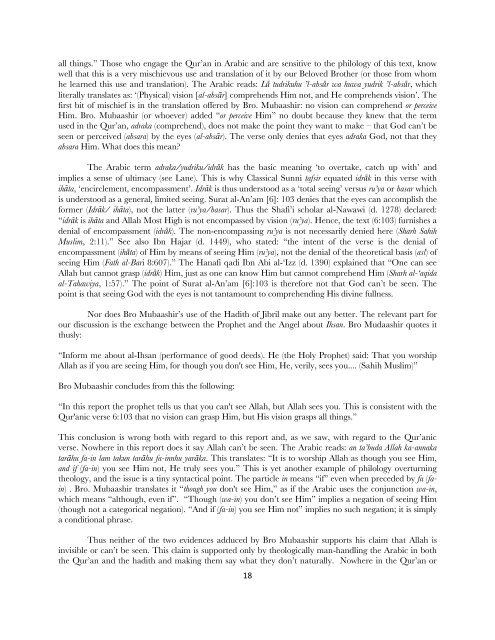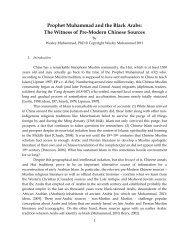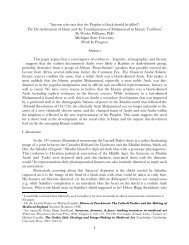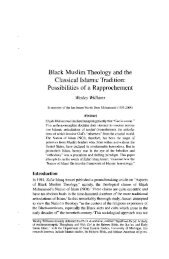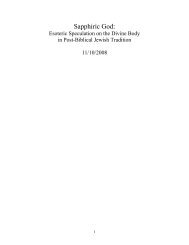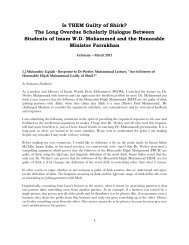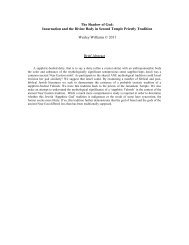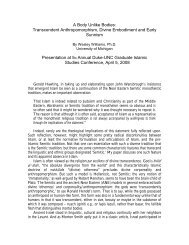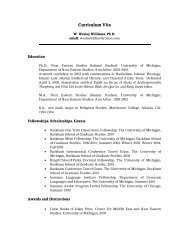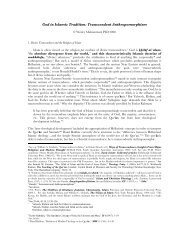Is THEM Guilty of Shirk? - Dr. Wesley Muhammad
Is THEM Guilty of Shirk? - Dr. Wesley Muhammad
Is THEM Guilty of Shirk? - Dr. Wesley Muhammad
Create successful ePaper yourself
Turn your PDF publications into a flip-book with our unique Google optimized e-Paper software.
all things.‖ Those who engage the Qur‘an in Arabic and are sensitive to the philology <strong>of</strong> this text, know<br />
well that this is a very mischievous use and translation <strong>of</strong> it by our Beloved Brother (or those from whom<br />
he learned this use and translation). The Arabic reads: Lā tudrikuhu ‟l-absār wa huwa yudrik ‟l-absār, which<br />
literally translates as: ‗(Physical) vision [al-absār] comprehends Him not, and He comprehends vision‘. The<br />
first bit <strong>of</strong> mischief is in the translation <strong>of</strong>fered by Bro. Mubaashir: no vision can comprehend or perceive<br />
Him. Bro. Mubaashir (or whoever) added ―or perceive Him‖ no doubt because they knew that the term<br />
used in the Qur‘an, adraka (comprehend), does not make the point they want to make – that God can‘t be<br />
seen or perceived (absara) by the eyes (al-absār). The verse only denies that eyes adraka God, not that they<br />
absara Him. What does this mean?<br />
The Arabic term adraka/yudriku/idrāk has the basic meaning ‗to overtake, catch up with‘ and<br />
implies a sense <strong>of</strong> ultimacy (see Lane). This is why Classical Sunni tafsir equated idrāk in this verse with<br />
ihāta, ‗encirclement, encompassment‘. Idrāk is thus understood as a ‗total seeing‘ versus ru‟ya or basar which<br />
is understood as a general, limited seeing. Surat al-An‘am [6]: 103 denies that the eyes can accomplish the<br />
former (Idrāk/ ihāta), not the latter (ru‟ya/basar). Thus the Shafi‘i scholar al-Nawawi (d. 1278) declared:<br />
―idrāk is ihāta and Allah Most High is not encompassed by vision (ru‟ya). Hence, the text (6:103) furnishes a<br />
denial <strong>of</strong> encompassment (idrāk). The non-encompassing ru‟ya is not necessarily denied here (Sharh Sahih<br />
Muslim, 2:11).‖ See also Ibn Hajar (d. 1449), who stated: ―the intent <strong>of</strong> the verse is the denial <strong>of</strong><br />
encompassment (ihāta) <strong>of</strong> Him by means <strong>of</strong> seeing Him (ru‟ya), not the denial <strong>of</strong> the theoretical basis (asl) <strong>of</strong><br />
seeing Him (Fath al-Bari 8:607).‖ The Hanafi qadi Ibn Abi al-‗Izz (d. 1390) explained that ―One can see<br />
Allah but cannot grasp (idrāk) Him, just as one can know Him but cannot comprehend Him (Sharh al-„aqida<br />
al-Tahawiya, 1:57).‖ The point <strong>of</strong> Surat al-An‘am [6]:103 is therefore not that God can‘t be seen. The<br />
point is that seeing God with the eyes is not tantamount to comprehending His divine fullness.<br />
Nor does Bro Mubaashir‘s use <strong>of</strong> the Hadith <strong>of</strong> Jibril make out any better. The relevant part for<br />
our discussion is the exchange between the Prophet and the Angel about Ihsan. Bro Mudaashir quotes it<br />
thusly:<br />
―Inform me about al-Ihsan (performance <strong>of</strong> good deeds). He (the Holy Prophet) said: That you worship<br />
Allah as if you are seeing Him, for though you don't see Him, He, verily, sees you.... (Sahih Muslim)‖<br />
Bro Mubaashir concludes from this the following:<br />
―In this report the prophet tells us that you can't see Allah, but Allah sees you. This is consistent with the<br />
Qur'anic verse 6:103 that no vision can grasp Him, but His vision grasps all things.‖<br />
This conclusion is wrong both with regard to this report and, as we saw, with regard to the Qur‘anic<br />
verse. Nowhere in this report does it say Allah can‘t be seen. The Arabic reads: an ta‟buda Allah ka-annaka<br />
tarāhu fa-in lam takun tarāhu fa-innhu yarāka. This translates: ―It is to worship Allah as though you see Him,<br />
and if (fa-in) you see Him not, He truly sees you.‖ This is yet another example <strong>of</strong> philology overturning<br />
theology, and the issue is a tiny syntactical point. The particle in means ―if‖ even when preceded by fa (fain)<br />
. Bro. Mubaashir translates it ―though you don't see Him,‖ as if the Arabic uses the conjunction wa-in,<br />
which means ―although, even if‖. ―Though (wa-in) you don‘t see Him‖ implies a negation <strong>of</strong> seeing Him<br />
(though not a categorical negation). ―And if (fa-in) you see Him not‖ implies no such negation; it is simply<br />
a conditional phrase.<br />
Thus neither <strong>of</strong> the two evidences adduced by Bro Mubaashir supports his claim that Allah is<br />
invisible or can‘t be seen. This claim is supported only by theologically man-handling the Arabic in both<br />
the Qur‘an and the hadith and making them say what they don‘t naturally. Nowhere in the Qur‘an or<br />
18


